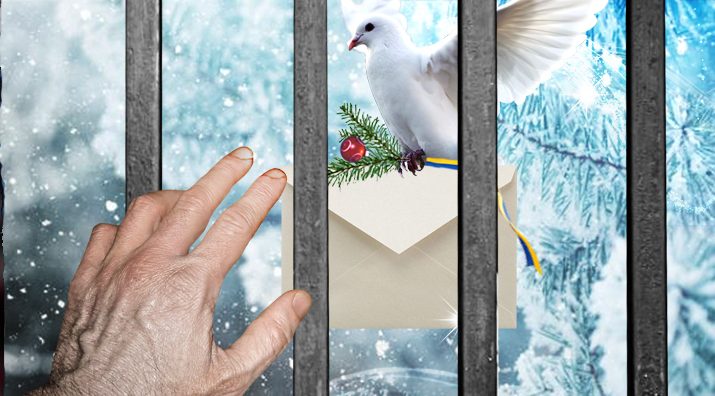The Kremlin’s Ukrainian political prisoners in Crimea are left to the mercy of fate. The issues of the occupied peninsula appear to have fallen by the wayside both in Ukraine and on the international plane. But with Ukraine’s all-weather friend Joe Biden and his team taking power, political prisoners and their families gained hope that their problems will be given more attention than before.
Ahead of senior Biden administration official Antony Blinken’s first visit to Kyiv on 5-6 May, Ukrainian political prisoner in Crimea Oleksiy Bessarabov made an appeal to the US Secretary of State. Will Blinken hear this plea for help?
Frequently, incarceration is the price of their peaceful dissent. Kangaroo courts falsify evidence to put innocent Crimeans behind the bars. Ukrainian human rights organizations recognise them as political prisoners because the only reason for their imprisonment is their ethnicity, religion, or dissenting political views.
Oleksiy Bessarabov is a Ukrainian political prisoner in Crimea accused on the basis of trumped-up charges. He called on Mr Blinken to raise the issue of the Ukrainian political prisoners in Crimea during the meeting of the US and Russian Presidents Joe Biden and Vladimir Putin.

In his statement, Bessarabov said,
“We, the political prisoners, bearing in mind the preparation of the meetings of the president of Ukraine, and then the president of the US with the Russian head of state, are convinced that the key topic must be the unconditional liberation of illegally detained by Russia persons in the prisons of Russia and Crimea. This is not the issue of politics but restoration of minimal trust, dignity and morality of national leaders of the XXI century.”
Bessarabov further noted that:
“Despite the fact that my name, as well as the names of dozens of other political prisoners, entered the lists of human rights NGOs such as Freedom House and Memorial, we are almost forgotten. Only our nearest and dearest, friends, and colleagues remember. We are forgotten because the issue of Crimea is brought to the table neither in the Normandy format nor in Minsk talks. These platforms discuss only the occupied Donbas but not Crimea.”
Oleksiy Bessarabov expressed his hopes for the power and influence of the US to facilitate prisoners liberation.
The appeal was transmitted to the US Department of State and the US Embassy of Ukraine but no response has been issued yet.
Oleksiy Bessarabov’s appeal to Mr Blinken resonates with an open letter issued by the Platform for the Release of Political Prisoners, a non-partisan association created by former Kremlin political prisoners to protect the rights and advocate for the release of all those imprisoned for political motives in Ukraine, in occupied Crimea and Donbas, and abroad. This is instructive with regard to the significance of the issue of the Kremlin’s Ukrainian political prisoners on the one hand, and global leaders turning a blind eye to the problem on the other.
The letter is addressed to the US State Secretary Anthony Blinken and three foreign ministers of Belgium, the Netherlands, and Luxembourg -- Sophie Wilmes, Stephanus Blok, and Jean Asselborn -- who arrived in Kyiv last night.
The Platform for the Release of Political Prisoners expressed deep respect and gratitude for this joint visit to Ukraine during wartime. They highlighted that 109 political prisoners are held in Russian prisons in Crimea or Russia and 230 remain in the occupied Donbas:
“In the West, many believe that after the release of film director Oleg Sentsov, journalist Roman Sushchenko, Crimean Tatar activist Akhtem Chiygoz, and some other prominent Kremlin prisoners, the issue is closed. But this is not the case. Russia continues repressions. A recent example is the arrest of another Ukrainian “spy” in Sevastopol in April. Russia feels impunity, no threats, it can continue construction of the Nord Stream 2. Russia is blamed in the West for Navalny, but almost no one mentions hundreds of Ukrainians imprisoned by the Putin regime in the occupied territories and deported to Russia.”
In the letter, former Kremlin political prisoners describe the issue as critical yet forgotten, and the Ukrainian government powerless and inactive in this regard. The letter puts forward the request for the Western states:
“We are not only approaching you as reputable politicians, but we are also requesting your countries to put on the table in contacts with Russia a clear message of unconditional release of all Ukrainians, which are Kremlin’s political prisoners as the measure of credibility for further negotiations on any topic or issue. Please help us to present the West as the moral authority for Ukraine and the rest of the world.”
In April 2019, Oleksii Bessarabov and Volodymyr Dudka were sentenced to 14 years of imprisonment and high fines. Later, the Supreme Court of Russia turned down the defence’s appeal and upheld the previous judgement.Kyiv denies the charges against Dmytro Shtyblikov and Volodymyr Dudka. Russian Memorial human rights centre recognised them as political prisoners.
Read also:
- Ukrainian ex-Kremlin hostages launch platform to free political prisoners held by Russia
- (No) right to a fair trial, or a manual to Russia’s conveyor of repressions in Crimea
- Why is the Kremlin taking Ukrainians as political prisoners





